Related Research Articles
The island of Cuba was inhabited by various Native American cultures prior to the arrival of the explorer Christopher Columbus in 1492. After his arrival, Spain conquered Cuba and appointed Spanish governors to rule in Havana. The administrators in Cuba were subject to the Viceroy of New Spain and the local authorities in Hispaniola. In 1762–63, Havana was briefly occupied by Britain, before being returned to Spain in exchange for Florida. A series of rebellions between 1868 and 1898, led by General Máximo Gómez, failed to end Spanish rule and claimed the lives of 49,000 Cuban guerrillas and 126,000 Spanish soldiers. However, the Spanish–American War resulted in a Spanish withdrawal from the island in 1898, and following three and a half years of subsequent US military rule, Cuba gained formal independence in 1902.
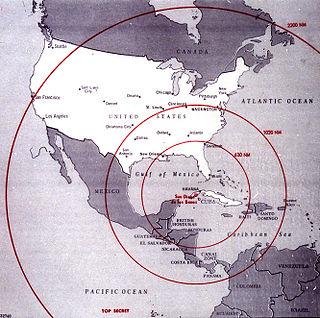
The Cuban Missile Crisis, also known as the October Crisis in Cuba, or the Caribbean Crisis, was a 13-day confrontation between the governments of the United States and the Soviet Union, when American deployments of nuclear missiles in Italy and Turkey were matched by Soviet deployments of nuclear missiles in Cuba. The crisis lasted from 16 to 28 October 1962. The confrontation is widely considered the closest the Cold War came to escalating into full-scale nuclear war.
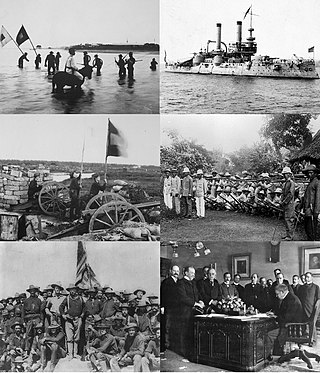
The Spanish–American War began in the aftermath of the internal explosion of USS Maine in Havana Harbor in Cuba, leading to United States intervention in the Cuban War of Independence. The war led to the United States emerging predominant in the Caribbean region, and resulted in U.S. acquisition of Puerto Rico, Guam, and the Philippines. It also led to United States involvement in the Philippine Revolution and later to the Philippine–American War.
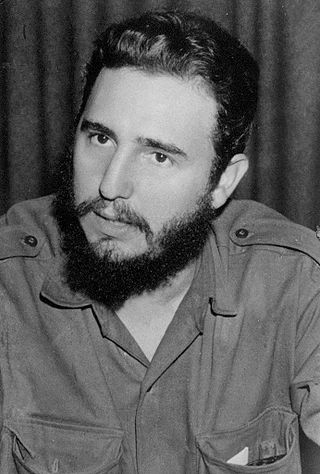
Fidel Alejandro Castro Ruz was a Cuban revolutionary and politician who was the leader of Cuba from 1959 to 2008, serving as the prime minister of Cuba from 1959 to 1976 and president from 1976 to 2008. Ideologically a Marxist–Leninist and Cuban nationalist, he also served as the first secretary of the Communist Party of Cuba from 1965 until 2011. Under his administration, Cuba became a one-party communist state; industry and business were nationalized, and socialist reforms were implemented throughout society.
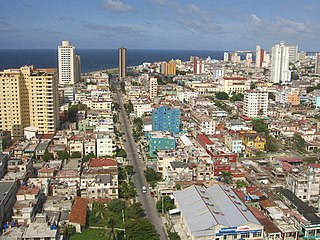
For the song by Camila Cabello, see Havana.

Fulgencio Batista y Zaldívar was a Cuban military officer and politician who was the elected president of Cuba from 1940 to 1944 and military dictator of the country from 1952 until his overthrow in the Cuban Revolution in 1959.
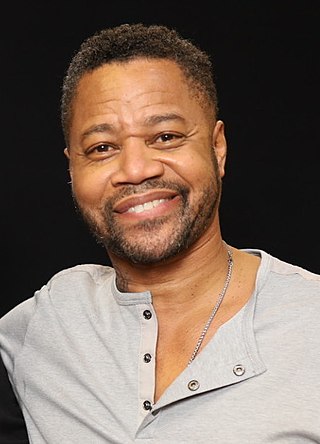
Cuba Mark Gooding Jr. is an American actor. After his breakthrough role as Tre Styles in Boyz n the Hood (1991), he won the Academy Award for Best Supporting Actor playing a football star in Jerry Maguire (1996). His other notable films include A Few Good Men (1992), Judgment Night (1993), Lightning Jack (1994), As Good as It Gets (1997), Men of Honor (2000), Pearl Harbor (2001), Snow Dogs (2002), Radio (2003), Norbit (2007), Linewatch (2008), Red Tails (2012), and The Butler (2013). He has done voice acting in Home on the Range (2004) and The Land Before Time XIII: The Wisdom of Friends (2007).
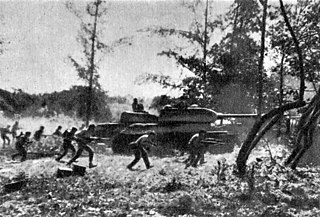
The Bay of Pigs Invasion was a failed military landing operation on the southwestern coast of Cuba in 1961 by the United States of America and the Cuban Democratic Revolutionary Front (DRF), consisting of Cuban exiles who opposed Fidel Castro's Cuban Revolution, clandestinely financed and directed by the U.S. government. The operation took place at the height of the Cold War, and its failure influenced relations between Cuba, the United States, and the Soviet Union.
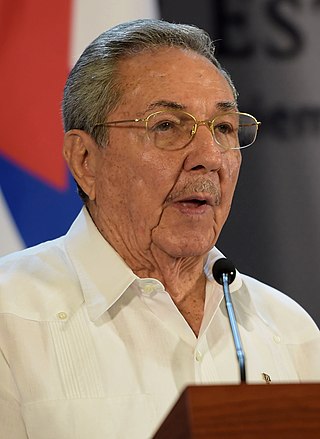
Raúl Modesto Castro Ruz is a Cuban retired politician and general who served as the first secretary of the Communist Party of Cuba, the most senior position in the one-party communist state, from 2011 to 2021, and President of Cuba between 2008 and 2018, succeeding his brother Fidel Castro.

The Cuban Revolution was the military and political overthrow of Fulgencio Batista's dictatorship, which had reigned as the government of Cuba between 1952 and 1959. The revolution began after the 1952 Cuban coup d'état, which saw Batista topple the nascent Cuban democracy and consolidate power. Among those opposing the coup was Fidel Castro, then a novice attorney who attempted to contest the coup through Cuba's judiciary. Once these efforts proved fruitless, Fidel Castro and his brother Raúl led an armed attack on the Cuban military's Moncada Barracks on 26 July 1953.

Mark Cuban is an American businessman and television personality. He is the former principal owner and current minority owner of the Dallas Mavericks of the National Basketball Association (NBA), co-owner of 2929 Entertainment, and was one of the main "sharks" on the ABC reality television series Shark Tank.
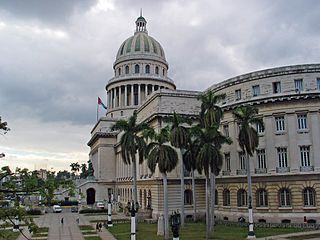
The United States embargo against Cuba has prevented U.S. businesses from conducting trade or commerce with Cuban interests since 1958. Modern diplomatic relations are cold, stemming from historic conflict and divergent political ideologies. U.S. economic sanctions against Cuba are comprehensive and impact all sectors of the Cuban economy. It is the most enduring trade embargo in modern history.
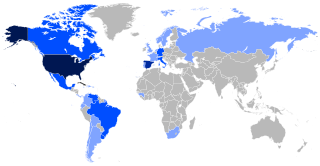
Cubans are the citizens and nationals of Cuba. The Cuban people have varied origins with the most spoken language being Spanish. The larger Cuban diaspora includes individuals that trace ancestry to Cuba and self-identify as Cuban but are not necessarily Cuban by citizenship. The United States has the largest Cuban population in the world after Cuba.

Cuba, officially the Republic of Cuba, is an island country, comprising the island of Cuba, Isla de la Juventud, and 4,195 islands, islets and cays surrounding the main island. It is located where the northern Caribbean Sea, Gulf of Mexico, and Atlantic Ocean meet. Cuba is located east of the Yucatán Peninsula (Mexico), south of both Florida and the Bahamas, west of Hispaniola, and north of Jamaica and the Cayman Islands. Havana is the largest city and capital. Cuba is the third-most populous country in the Caribbean after Haiti and the Dominican Republic, with about 10 million inhabitants. It is the largest country in the Caribbean by area.

Modern diplomatic relations between Cuba and the United States are cold, stemming from historic conflict and divergent political ideologies. The two nations restored diplomatic relations on July 20, 2015, after relations had been severed in 1961 during the Cold War. The U.S. has maintained a comprehensive trade embargo against Cuba since 1958. The embargo includes restrictions on all commercial, economic, and financial activity, making it illegal for U.S. corporations to do business with Cuba.

After the establishment of diplomatic ties with the Soviet Union after the Cuban Revolution of 1959, Cuba became increasingly dependent on Soviet markets and military aid and was an ally of the Soviet Union during the Cold War. In 1972 Cuba joined the Council for Mutual Economic Assistance (Comecon), an economic organization of states designed to create co-operation among the communist planned economies, which was dominated by its largest economy, the Soviet Union. Moscow kept in regular contact with Havana and shared varying close relations until the end of the Soviet Union in 1991. Cuba then entered an era of serious economic hardship, the Special Period.
Christianity is the most widely professed religion in Cuba, with Catholicism being its largest denomination. A significant share of the Cuban population is either non-religious or practices folk religions.

Relations between Cuba and Venezuela were established in 1902. The relationship deteriorated in the 1960s and Venezuela broke relations in late 1961 following the Betancourt Doctrine policy of not having ties with governments that had come to power by non-electoral means. A destabilizing factor was the Cuban support for the antigovernment guerrilla force that operates in remote rural areas. Relations were reestablished in 1974.

Ernesto "Che" Guevara was an Argentine Marxist revolutionary, physician, author, guerrilla leader, diplomat, and military theorist. A major figure of the Cuban Revolution, his stylized visage has become a ubiquitous countercultural symbol of rebellion and global insignia in popular culture.

Miguel Díaz-Canel Bermúdez is a Cuban politician and engineer. He has served as the 8th First Secretary of the Communist Party of Cuba since 2021 and as the 17th President of Cuba since 2019. In his capacity as First Secretary he is the most powerful person in the Cuban government.
References
- ↑ The Jews of Cuba US Interests Section of the Department of State as a resource for information on Cuba